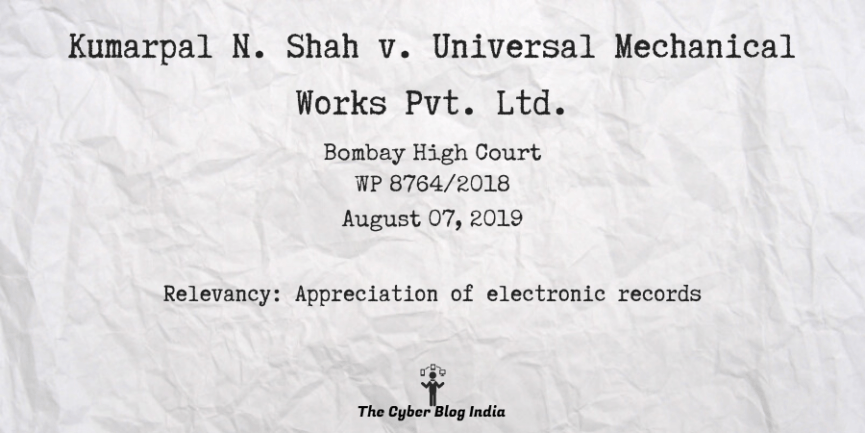Kumarpal N. Shah v. Universal Mechanical Works Pvt. Ltd.

Kumarpal N. Shah v. Universal Mechanical Works Pvt. Ltd.
AIR 2019 Bom 290
In the High Court of Bombay
WP 8764/2018
Before Justice Dama Seshadri Naidu
Decided on August 7, 2019
Relevancy of the case: Appreciation of electronic records.
Statutes & Provisions Involved
- The Information Technology Act, 2000 (Section2(t), 4)
- The Indian Evidence Act, 1872 (Section 3, 17, 62, 65B, 65(f))
Relevant Facts of the Case
- A landlord had filed a suit for the eviction of property and later died. His wife and children were regarded as the legal representatives on records.
- They applied for the court’s leave to mark a bunch of documents as secondary evidence under Section 65(f) of the Indian Evidence Act, 1872 which was allowed by the Trial Court.
- Later, an affidavit was filed by one of the owners before the trial court with a list of documents to be marked, some of which was objected by the tenants stating that they were private documents and required to be marked through the authors of those documents only.
- The Trial Court upheld most of the objections of the tenants. Hence, the present writ petition was filed by the owners.
Prominent Arguments by the Advocates
- Shri Meheran Irani, for the Respondents: “Trial Court should preserve the respondent’s right to question the authenticity of the documents, especially the contents of the document. The mere marking of documents doesn’t prove the contents. So, the tenant’s objections to the contents of the document or their binding nature shall remain unaffected.”
Opinion of the Bench
- Section 3 of the Indian Evidence Act considers electronic records as Documentary evidence. Under Section 4 of the Information Technology Act, legal recognition has been provided to electronic records.
- “Computer printouts” apparently fall under the second category of Section 17 of the Indian Evidence Act, 1872 but actually are documents in the “electronic form” which would fall under the third category of the said provision.
- As per Section 65B, printout shall be deemed to be a document, if the conditions in the section are satisfied regarding the information and computer in question and would be admissible as evidence in legal proceedings without further proof or production of the original. It would be treated as evidence of any contents of the original.
- If the printout is taken by the originator or the “owner” of the data and he/she appends his/her manual or digital signature, it can be accepted as primary evidence without any certification required under Section 65B.
- If the printout is produced by anybody other than the owner, it can be treated as secondary evidence and the certification may be insisted upon.
Final Decision
- The petitioners were allowed to have the documents marked through the author or a competent person.
- It was also stated that the respondents were free to raise questions regarding the binding nature and relevancy of the documents.
- The impugned order of the trial court which upheld the objections of the tenants was set aside.
इस केस के सारांश को हिंदी में पढ़ने के लिए यहाँ क्लिक करें | To read this case summary in Hindi, click here.
